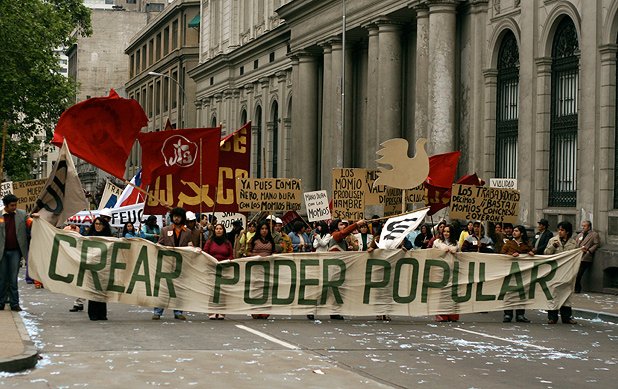Disclaimer: Since the history covered in this article is relatively recent, is tightly intertwined with politics, and can be interpreted in many different ways, it is sensitive.
It’s the 1970s. World War II ended a decade and a half ago, but the world isn’t much better for it. Instead, a tense not-quite-a-war consumes the globe, affecting multiple countries on almost every continent—proxy wars rage in Vietnam and Korea. Countries like Spain, China, and Cuba struggle to resolve internal politics. Propaganda is rampant, and extremist groups are rising throughout the world. The threat of nuclear weapons—and the destruction they bring—looms over the world. Ideologies struggle over each other, even in the far corners of the world, away from the United States and the Soviet Union. Internal struggles arise, later to become one of the darkest chapters in American history, in the then small country of Chile.
In the previous decade, America, under President John F. Kennedy, had established its position against the spread of communism and the influence of the Soviet Union. It was actively trying to stop the Soviet Union from further influencing other nations and spreading socialist ideas. It intervened in India, Afghanistan, Korea, and Vietnam (in which the Vietnam War continues to haunt both American veterans and Vietnamese citizens). It also aimed its attention at Latin America, a region that may have seemed vulnerable to being overcome by a socialist government. Chile was one of the countries affected by Kennedy’s Alliance for Progress, the alliance that was created to improve the economies of Latin America. For a time, this policy kept money flowing into Chile, and the people were satisfied until the growth within the state led to various socioeconomic problems.
Before the decade’s end, it looked unlikely that Chile would remain capitalist and under America’s influence. Chile’s socialist party is growing in popularity as their viewpoint offers a radical solution to the socio-economic problems in the country. Confused and concerned about where this would go, the American government shifted its policy. The president, Richard Nixon, alongside his secretary of state, Henry Kissinger, who was willing to do whatever it took to get socialism and any left-wing ideas out of Chilean politics, used the CIA to spread propaganda against Salvador Allende, the socialist candidate for the Chilean election of 1970. Alongside propaganda, Nixon and Kissinger used the CIA to help fund the campaigns of rival parties to Allende, but their attempts were unsuccessful.
Salvador Allende won the election of 1970, which marked one of the first instances of a people peacefully choosing to have a socialist state without being coerced. Though his economic policy quickly proved unsuccessful, and the Chilean people did not particularly love his presidency, the United States still saw his socialist government as a threat since it set such a huge precedent. Undoubtedly, the United States feared other states would go through the same route, and so they came to the decision that the socialist rule of Chile needed to be shut down. And this is where the dark part comes in.
Although the level of the United States’ involvement in the coup d’etat that was to ensue is unclear to this day, documents describing discussions between Nixon and Kissinger have been made unclassified. Many of these documents suggest the United States government encouraged the coup d’etat against Allende, a rightfully elected socialist president, with Kissinger and Nixon often establishing an inevitable yet horrible action. In 1973, the Chilean military had Allende surrounded in the presidential building and forcibly seized power from him. Some theories suggest that Allende may have been assassinated, while others suggest that he may have succumbed to pressure as Adolf Hitler did about twenty years before. Following Allende’s death, a man named Augusto Pinochet came to power and named himself as a military dictator of Chile, abolishing democracy for a time.
What makes this event a truly dark time in American history is that it’s an instance of its government acting against the very principles it set out in its constitution — the people’s rights to overthrow a tyrannical government and the establishment of democracy. Whereas Chile functioned under a fair democracy before American intervention, the United States ultimately led to the destruction of the country’s democracy even while being a staunch advocate for it. But was the result — a non-communist world — worth the sacrifice of the ground on which our country stands?
Works Cited
“Allende and Pinochet in Chile | The 20th Century | World History | Khan Academy.” YouTube, 9 May 2011, www.youtube.com/watch?v=Um92GZLCQ_Q. Accessed 30 Nov. 2023.
digitalcommons.bucknell.edu/cgi/viewcontent.cgi?article=1152&context=honors_theses. Accessed 01 Dec. 2023.
“‘Allende Wins.’” National Security Archive, 4 Sept. 1970, nsarchive.gwu.edu/briefing-book/chile/2020-09-04/allende-wins. Accessed 01 Dec. 2023.
Holland, Steve, and Arshad Mohammed. “Henry Kissinger, Dominant US Diplomat of Cold War Era, Dies Aged 100.” Reuters, Thomson Reuters, 30 Nov. 2023, www.reuters.com/world/us/henry-kissinger-dominant-us-diplomat-cold-war-era-dies-aged-100-2023-11-30/. Accessed 01 Dec. 2023.
